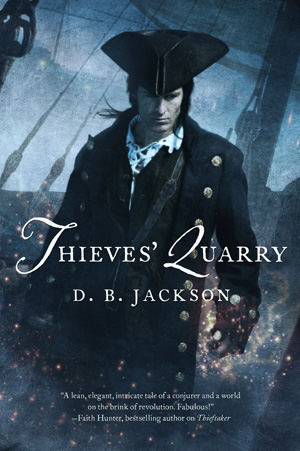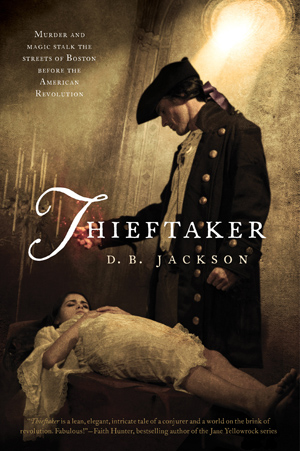My Amazing and Stupendously Interesting Interview with DB Jackson
Hello everyone! Today I’m really delighted to have my friend DB Jackson (aka David Coe) here for an interview about his new book, Thieves’ Quarry, sequel to Thieftaker. He’s an awesome person and a tremendous writer and I’m so happy he’s here. Before I get into the interview, I want to take a minute to talk about Thieftaker.
 I really enjoyed this book. It was one of those that makes you think and lends a sense of wonder and makes you want to go read more history and yet you can’t, because you Must. Get. To. The. End. Of. The. Book. Right now.
I really enjoyed this book. It was one of those that makes you think and lends a sense of wonder and makes you want to go read more history and yet you can’t, because you Must. Get. To. The. End. Of. The. Book. Right now.
Ethan is a marvelously broken character. He’s got honor and morals, and yet is so very confused and torn. He’s brave and heroic, but lives in a world where right and wrong is very gray. I love that he’s not what *I* expected of a character set just before the American Revolution. He isn’t a supporter. I can foresee he might change, for reasons in the book, but he’s loyal. I think it’s a tremendously complicated thing because it asks readers to rethink how they might have acted in the same situation.
The magic is unusual and intriguing, and I love the way it plays out in the story. I also love the whole ensemble of characters. They are complex and developed and their stories weave together into a tense story of– Well, that’s for you to find out. You really should read this book and if you’re like me, you’ll be wanting to read the next as soon as you can. Oh, and one more thing, thieftakers were real. And now without further ado, on to the interview. But first, a little bit about the books.
THIEVES’ QUARRY, the second volume in the Thieftaker Chronicles (which began with last year’s release, THIEFTAKER) continues the adventures of Ethan Kaille, thieftaker and conjurer. Set in colonial Boston, in the tumultuous year of 1768, THIEVES’ QUARRY begins with a fleet of British naval vessels, carrying over a thousand soldiers, anchored in Boston Harbor, awaiting orders to dock and commence the occupation of the city.
Before the soldiers can disembark, however, a powerful conjuring of unknown origin awakens Ethan from a deep sleep. Within hours he learns that the magick has killed every man aboard one of the ships, the HMS Graystone. Ethan is hired by agents of the Crown to learn who has cast this deadly spell, and soon his inquiry entangles him in a frantic search for a cache of stolen pearls, the politics of the burgeoning rebellion against British authority, and a deadly battle among conjurers.
1. In Thieftaker, you indicated that the book didn’t start out as a historical. Tell us about why you chose pre-revolution Boston and how you adjusted the story and the characters to fit the time period and setting.
As you say, Thieftaker and the rest of the series, as originally conceived, was going to be an alternate world fantasy with an urban fantasy feel. But the series concept was based on my interest in thieftakers, and, in particular on a thieftaker named Jonathan Wild, who lived in London in the 1730s, and who is the inspiration for the character of Sephira Pryce, my hero’s nemesis. Knowing that the series had some basis in history, and knowing as well that I have a Ph.D. in history, my editor at Tor Books urged me to consider changing the series to a historical. After some resistance on my part, I saw that he was right, and began to think about how I might do that.
The choice of pre-Revolutionary Boston was based, at least initially, on two things. First, I simply love that time and place in U.S. History. It’s a fascinating period, filled with dynamic personalities and powerfully important political events. And second, it’s not a time or place that has received much attention in speculative fiction.
What I didn’t anticipate was how remarkably easy it would be to translate my alternate world narrative to this real-world historical setting. The city I created for the original version of the story was a bit seedy, it had a bustling waterfront with lots of trade and cultural inflow, and it was embroiled in a good deal of political intrigue. Boston in the 1760s was much the same. My lead character, Ethan Kaille, adapted easily to his new surroundings; he had been in the king’s navy, he had been a convicted mutineer and prisoner, and he had lost almost everything dear to him during a long term in prison. All of that could stay the same. The hardest part was meshing my murder mystery with events that I had not created for the storyline, but that were, in fact, based in history. But even that worked out. The historical backdrops of the first two books — the Stamp Act Riots in Thieftaker, and the occupation of Boston in Thieves’ Quarry — lend themselves to the stories I had wanted to tell originally. The process was so painless start to finish, it’s enough to make me think that somehow the series was meant to be a historical all along.
2. Talk about the Sons of Liberty and how you chose to dramatize/personalize those characters. For instance, Samuel Adams. How much did you research the men and their lives? How much writer’s latitude did you take?
Writing about Samuel Adams, James Otis, and some of the other personalities from that time, in particular the Sons of Liberty, was one of the great draws of making the Thieftaker books into historical fantasies. I researched them extensively, reading several biographies of Adams, a long book about Paul Revere (who doesn’t even make an appearance until the third Thieftaker book, due out next year) and finding out all I could about the others. I feel very strongly about this: Ethan Kaille, Sephira Pryce, and the other fictional characters are mine to do with as I please. But Samuel Adams and his fellow revolutionaries, along with every other historical figure I mention — they don’t belong to me. I’m borrowing them from our nation’s shared history in order to enhance my story and give it more authenticity, and also, I hope, to make it more entertaining. I feel that I owe it to those personalities, as well as to my readers, to make them as true-to-life as I possibly can
Now, of course, there are limits to what I can do in this regard. The historical personalities never actually met Ethan Kaille. They never encountered conjurers (or thieftakers, for that matter). They never had to think about the murders I’ve written into my books. And so their reactions to these things spring from my imagination. In that way, I had to take some latitude. But I have tried at every opportunity to have them react to situations and contribute to conversations in ways that conform with what we know about them. I want my readers to feel that they are immersed in my historical setting, and getting these real-life characters right is a crucial part of that.
3. Ethan is a Loyalist. Without spoiling anything that happens in Thieftaker or Thieves’ Quarry, it feels like he has potential and reason for changing his mind and joining the revolution side. Can you talk about the choice to make him Loyalist and how that develops as Ethan’s story progresses? It is unexpected (at least for me) for him to be on Loyalist side, but I find his feelings on the subject very compelling and sympathetic. You wrote him well.
Thanks, Di. Ethan is the most complex and compelling character I’ve ever written. I put him through so much even before the books themselves begin — he is scarred and in many ways broken when my readers meet him. But he is struggling to be whole again, and that demands of him that he both create a new life for himself, and also embrace those elements of his past that are not sources of pain and regret. Ethan was raised in England, and his father was an officer in the British navy. Ethan himself enlisted as a young man and served aboard the HMS Stirling Castle during the War of the Austrian Succession. He was at the Battle of Toulon. (Yes, I know he’s a fictional character, but to me he’s very real, and his past is important to explaining his political views.)
He left the navy somewhat embittered by his experience during the war, but he remains a loyal subject of the Crown. He has a deep respect for the rule of law, and sees his own legal transgressions (which led to his imprisonment and the fourteen years he spent laboring on a sugar plantation) as the greatest error of his life. Now to be sure, it would have been easy for him to turn the dark elements of his personal history into excuses to reject all that he once believed. But that’s not his way. And he sees in the protests orchestrated by the Sons of Liberty a wanton disregard for the law, for the sanctity of personal property, and even for some of the ideals that Adams and others claim to embrace.
Now, I can also say, without giving away too much, that in Thieves’ Quarry, his thinking in this regard begins to change. And this is also something that we see reflected in the social history of Boston at the time. People who in 1765 thought that the Sons of Liberty had gone too far, see in the overreactions of the Crown to protests and acts of defiance during the later part of the decade reasons to rethink their loyalty to Parliament and King George III. Just as Ethan does.
Finally, I should also admit that you are not the only reader to question me about this. Several readers found Ethan’s Tory leanings bothersome. But I feel that they make him a more interesting protagonist. It’s easy to like a character who thinks as we do on all important issues. I believe the fact that Ethan is a Loyalist makes him more challenging, and thus more interesting.
4. You know I love some good research. Name five cool things you learned in researching this book that you didn’t know and that we need to know.
 The most important (and disruptive) thing I learned, which forced me to go back and revise both Thieftaker and Thieves’ Quarry, is that prior to the beginning of the occupation in October 1768, there was literally no British military presence in Boston. We think of Boston as being filled with “redcoats,” but before 1768, that simply was not the case.
The most important (and disruptive) thing I learned, which forced me to go back and revise both Thieftaker and Thieves’ Quarry, is that prior to the beginning of the occupation in October 1768, there was literally no British military presence in Boston. We think of Boston as being filled with “redcoats,” but before 1768, that simply was not the case.
Other things I learned . . . Well, I’m going to take the liberty of including both Thieftaker books in this question, since a lot of what I learned is stuff I encountered during my initial research for the series:
— Throughout his life, Samuel Adams was afflicted with a mild palsy — what we know today as Benign Essential Tremor — that made his head and hands shake.
— Boston was essentially a lawless city in the 1760s. There was a Sheriff of Suffolk County, a man named Stephen Greenleaf, but aside from a few men of the watch, he had no police force at his disposal. So, while there were actually no thieftakers in Boston in the 1760s, there really could and should have been. God knows Greenleaf needed the help . . .
— There were no gas street lights in Boston until 1774, when the technology was finally perfected by one Paul Revere. This was something I learned very early on, because Ethan spends a lot of time abroad in the streets at night, and I needed to know whether those streets were lit or dark.
— After the Great Fire of 1760, which swept through the Cornhill section of Boston destroying over 350 buildings, the city Selectmen mandated that all new construction be of brick or stone rather than wood. The city had been ravaged by fires again and again throughout the seventeenth and eighteenth centuries, and at last they’d had enough. This mandate didn’t end fires in the city by any means, but it did mitigate them somewhat.
There you go; that’s five (including the thing about the occupation).
Thanks so much for the great questions. This has been fun!
*****
D.B. Jackson is also David B. Coe, the award-winning author of more than a dozen fantasy novels. His first book as D.B. Jackson, the Revolutionary War era urban fantasy, Thieftaker, volume I of the Thieftaker Chronicles, came out in 2012 and is now available in paperback. The second volume, Thieves’ Quarry, has just been released by Tor Books. D.B. lives on the Cumberland Plateau with his wife and two teenaged daughters. They’re all smarter and prettier than he is, but they keep him around because he makes a mean vegetarian fajita. When he’s not writing he likes to hike, play guitar, and stalk the perfect image with his camera.
http://www.dbjackson-author.com/blog
http://www.facebook.com/dbjacksonAuthor
http://www.goodreads.com/dbjackson
http://amazon.com/author/dbjackson
5 Comments
Douglas Meeks
Excellent interview, I have not read the books yet but the people on the forums that have all seem to be smitten with them. Even without having read the books I still found this to be very interesting information to see how the story came into being.
D.B. Jackson
Thanks for the kind response, Douglas. Glad you enjoyed the interview. Hope you enjoy the books, too. And thank you, Di, for hosting me on your site. I’ve been on the road all day and only just checked in, but the interview looks terrific.
Pingback:
Pingback:
Leslie
Great interview. I just finished reading Thieves Quarry this morning and I loved it. Can’t wait to see what Ethan will be up to next!